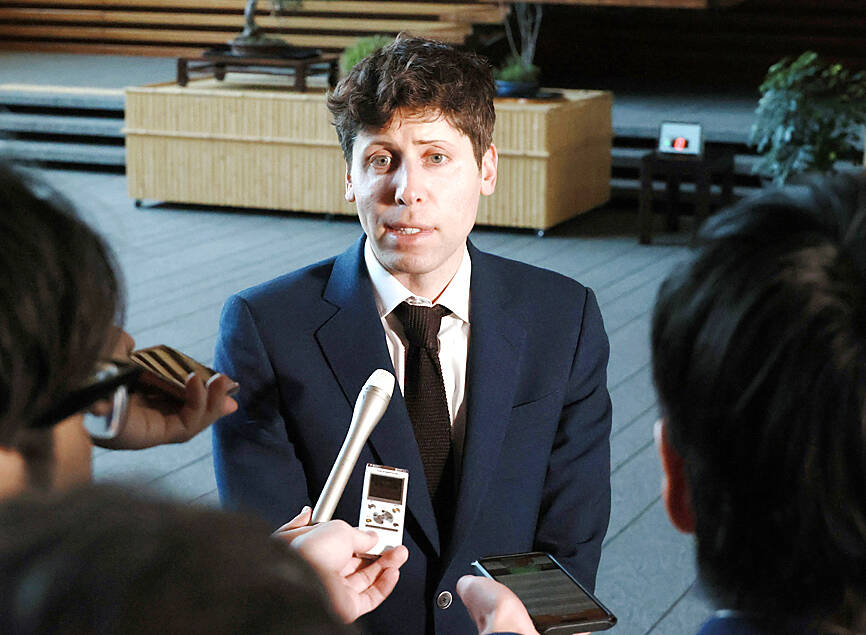Sam Altman, cofounder and chief executive officer of OpenAI, said the organization is looking at opening a Japan office and expanding Japanese-language services after meeting with Japanese Prime Minister Fumio Kishida.
“We hope to spend much more time, and engage with the wonderful talent and build something great for the Japanese people,” Altman told reporters in Tokyo yesterday. “It really is amazing to see the adoption of this technology in Japan.”
OpenAI has set off a frenzy of interest in artificial intelligence (AI) technologies since unveiling its ChatGPT service in November last year.

Photo: EPA-EFE
Microsoft Corp agreed to pour US$10 billion into the company and has integrated the technology into its Bing search engine. Google, the world’s leading search service, has responded with AI integrations of its own, while China’s SenseTime Group Inc (商湯科技) yesterday unveiled an AI-powered chatbot called “SenseChat” to challenge ChatGPT.
Altman said that he discussed the technology’s potential with Kishida, and how to mitigate the downsides.
They also talked about how to be thoughtful about the risks and how to make AI “as good for people as we can make it.”
Altman said OpenAI would work to make its models as good as possible in the Japanese language and for the Japanese culture.
“We’ll be back soon,” he said.
However, in China, shares related to AI plunged after a state media outlet urged authorities to step up supervision of potential speculation.
The ChatGPT concept sector has “signs of a valuation bubble,” with many companies having made little progress in developing the technology, the Chinese-language Economic Daily* wrote in a commentary.
Regulators should strengthen monitoring and crack down on share-price manipulation and speculation to create “a well-disclosed and well-run market,” reported the newspaper, which runs a Web site officially recognized by Beijing.
Companies should develop the capabilities they propose, while investors should refrain from speculating, it said.
CloudWalk Technology Co (雲從科技) tumbled a record 20 percent, while 360 Security Technology Inc (三六零安全科技) dropped by 10 percent, the most in three years. Beijing Haitian Ruisheng Science Technology Ltd (海天瑞聲科技) sank 15 percent.
“Generative AI is the hottest trend now and many tech companies will be launching their own versions in the coming months,” Union Bancaire Privee senior analyst Ling Vey-sern (凌煒森) said. “While valuations may rise to such news, the actual financial impact to these companies may be difficult to gauge at this juncture, and may lead to disappointment eventually.”

Nvidia Corp chief executive officer Jensen Huang (黃仁勳) on Monday introduced the company’s latest supercomputer platform, featuring six new chips made by Taiwan Semiconductor Manufacturing Co (TSMC, 台積電), saying that it is now “in full production.” “If Vera Rubin is going to be in time for this year, it must be in production by now, and so, today I can tell you that Vera Rubin is in full production,” Huang said during his keynote speech at CES in Las Vegas. The rollout of six concurrent chips for Vera Rubin — the company’s next-generation artificial intelligence (AI) computing platform — marks a strategic

Enhanced tax credits that have helped reduce the cost of health insurance for the vast majority of US Affordable Care Act enrollees expired on Jan.1, cementing higher health costs for millions of Americans at the start of the new year. Democrats forced a 43-day US government shutdown over the issue. Moderate Republicans called for a solution to save their political aspirations this year. US President Donald Trump floated a way out, only to back off after conservative backlash. In the end, no one’s efforts were enough to save the subsidies before their expiration date. A US House of Representatives vote

REVENUE PERFORMANCE: Cloud and network products, and electronic components saw strong increases, while smart consumer electronics and computing products fell Hon Hai Precision Industry Co (鴻海精密) yesterday posted 26.51 percent quarterly growth in revenue for last quarter to NT$2.6 trillion (US$82.44 billion), the strongest on record for the period and above expectations, but the company forecast a slight revenue dip this quarter due to seasonal factors. On an annual basis, revenue last quarter grew 22.07 percent, the company said. Analysts on average estimated about NT$2.4 trillion increase. Hon Hai, which assembles servers for Nvidia Corp and iPhones for Apple Inc, is expanding its capacity in the US, adding artificial intelligence (AI) server production in Wisconsin and Texas, where it operates established campuses. This

US President Donald Trump on Friday blocked US photonics firm HieFo Corp’s US$3 million acquisition of assets in New Jersey-based aerospace and defense specialist Emcore Corp, citing national security and China-related concerns. In an order released by the White House, Trump said HieFo was “controlled by a citizen of the People’s Republic of China” and that its 2024 acquisition of Emcore’s businesses led the US president to believe that it might “take action that threatens to impair the national security of the United States.” The order did not name the person or detail Trump’s concerns. “The Transaction is hereby prohibited,”